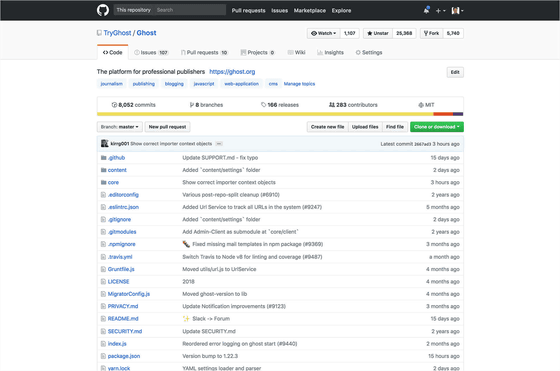CMS "Ghost" which began to make over 100 million yen annually starting from Kickstarter looks back on the five years of turbulence

Open source CMS platform which started from Kickstarter's campaign in October 2013 "Ghost"Looking back over the past five years.
After 5 years and $ 3 M, here's everything we 've learned from building Ghost
https://blog.ghost.org/5/
Ghost's monthly revenue (MRR) is 82,000 dollars (about 8.9 million yen), annual net revenue is 1.2 million dollars (about 130 million yen), total revenue for 5 years is about 3 million dollars (about 33 million Ten thousand yen), it is said that the profit has steadily improved from the first year of service start. There is a repository on Github as an open source platform, but the number of stars gained so far is as high as 25,000. The actual number of websites actually using Ghost is about 520,000, and the main customers include names such as Apple, Tinder, DuckDuckGo, Mozilla, OpenAI, OkCupid, Square, Vevo, DigitalOcean, Napster, CloudFlare It is continuous,Other well-known companiesWe have our customers.
Ghost - The Professional Publishing Platform

Founder'sJohn O'NolanMr. said that he started Ghost thinking "I want to build an open source publishing platform to give power to independent creators." It seems that he thought that it was part of social experiments at the beginning, he said that he aimed to create a workplace where he wanted to work, do the work he felt wanted to do. Started as a nonprofit organization, Ghost is an open sourceMIT licenseBased on this code, we are releasing all code and developing it.
Since Ghost is a nonprofit organization in the first place, there is no stock in the company. Organizations can not be cashed, and the products they offer are open source so anyone can freely use the code. Ghost's goal is to "create the best products", and we are building more open software to support sustainable blogs and websites than traditional ones.
O'Nolan says, "The reward paid by working at Ghost is similar to the case of earning income by playing games." In addition, Mr. O'Nolan said that by creating an organization that can not be sold, attachment to the organization itself increased, "I never made a company I would not want to sell."

byIgor Ovsyannykov
Although it is Ghost that it is profitable from the first year, it seems that he still had a pretty busy time to make the business sustainable for the first few years from the start. Nevertheless, in 2017 when earnings stabilized, I decided not to make earnings the primary goal, but instead put emphasis on health indicators such as employee working hours and performances. Of course, it seems that they pay full attention to earnings even in 2018, but this does not prompt decision making. Decision making is based on the "what we want to do" basis as it is originally.
It seems that Ghost produced businesses and products of a structure that they can work indefinitely. Investors are raising returns, financing for IPOs, or just acquiring other companies It is noteworthy that Ghost is a nonprofit organization, so it does not relate to such pressure.
Ghost has a steady income every month despite being a nonprofit organization. From the graph below showing the monthly revenue from May 2017 to May 2018, you can see that the growth has been steadily rising steadily.

Looking back on Ghost's business over the past five years, Mr. O'Nolan said, "It is difficult to build a business, whether you make a profit or not, it is even more difficult to make it open source. It is also difficult to create a product that will become a website, and it is very difficult to host a website. " Still, open source products and highly profitableSaaSWe have compiled some lessons learned through Ghost's business, including business, major hosting platform, etc.

byBethany Legg
◆ Define direction as a platform
Ghost decided to make everything as simple and user-oriented as possible when starting the business. Originally, it seems that we planned to develop the application as a closed source platform, but eventually we will develop it in open source, and that we were able to construct a socially positive business model accordingly I will. Also, as most open source platforms are terrible UI designs, "We have a great UI design! This is the best for both worlds (closed source and open source)," O 'Nolan wrote.
To keep simplicity, Ghost was created as a centralized platform, not a distributed platform. Distributed platforms tend to be complicated software that demands a high technical level and expertise also for users, which makes it difficult to use for users other than average engineers. Also, distributed platforms are basically set up complicated, and in many cases UX is inferior to a centralized platform. On the other hand, the centralized platform basically has the disadvantage that it is inferior to distributed platforms in terms of power and flexibility.
Therefore, Ghost aimed at maintaining convenience and ease of use with the aim of achieving a good balance between distributed type and concentrated type, it seems that Ghost intentionally tried to restrict the flexibility of the product and made it simple. However, with feedback from users, it became clear that for general users it was not simple, and for professional users it was found to be inflexible, so that both convenience and ease of use I notice that it is finished in the worst thing that I could not achieve either of the aimed results.
Ultimately, Ghost seems to have shifted to develop for professional users seeking the functionality and flexibility as software, abandoning the simplicity as software that the general user wants. This is the decision to get the most tribute in the 5 years of development and it is the reason why I could survive in tough competition.

bySmart
◆ Ghost's marketing success and failure
The most best thing about Ghost's marketing strategy is "to do it over and over again". So, at least twice a year, Ghost updates the software and publishes it. Although most companies do not make such small updates, Ghost seems to have continued updating software focusing solely on making purely excellent websites. By doing so, Mr. O'Nolan said that he succeeded in impressing reliable products, great support and strong customer.
The biggest failure in Ghost's marketing is documentation and resources. To solve this, in GhostActively hire developersWe are doing.
In addition, as another success example, "to provide software of the latest version one step before the official release to a small group" is cited. For example, Ghost is testing an affiliate program at the time of article creation and has plans to release it as "Ghost (Pro)". It seems that Ghost (Pro) is planning to pay 30% of revenue as a fee to users, and it is experimentally introduced to some users as a beta test.
![]()
byrawpixel
◆ Building a distributed team is easier and harder than you imagine
Ghost 's development team exists all over the world. How do you check whether the development teams in various countries are working and do task management? Also, how do you pay salaries to employees and how do you sign contracts? The answer to these questions is simple, "hire a person who can trust". The tools that should be used for such team management are Slack, Zoom and Github.
As a difficult thing to cheer about knowing the spirit of employees, I find a glimpse of the difficulty because I do not really work face to face. O'Nolan said that the real challenge of distributing team members to remote locations is 'human being rather than business'.

byNeONBRAND
◆ Open source development is broken than ever
Ghost's development uses Github as a repository, but "Github is really sad," O'Nolan points out. Github has problems with various elements such as design accessibility security security internationalization performance SEO.
O'Nolan points out that there is "freedom given to developers" that open source can build as desired by the user. Although Ghost makes basic software, users can freely expand and integrate software freely as they desire. With closed source, these things can not be done first. Although the advantage of the open source platform is precisely this degree of freedom, GitHubPostgresThe point that it does not support is a problem.
This is a harmful effect that GitHub is too transactional, and it says this is a problem due to the large number of support tools than collaboration.

There is no excellent means for fund raising by non-profit organizations for journalism / technology
O'Nolan said that the big surprise gained in the past five years is "There are no good financing tools for journalism / technology."
When he started the project he thought he would be able to receive subsidies, but he seems to have noticed that there are no such options. Although he searched for the possibility of support from the Knight Foundation, the Mozilla Foundation, the Ford Foundation, Google News Initiatives, etc., these organizations are supposed to support only projects of their country (primarily America) , It seems that the examination to give a grant is more complicated than I imagined.
Although Ghost says that there is no problem in terms of finance at the present time, it states that "Ambition is big but resources are limited", and the possibility that huge amounts of funds may be needed to realize a bigger idea in the future There is also there. While watching the project, it is one of the options to collect money with cloud funding like Kickstarter, but if there is any other idea, "I want you to feel free to send me a message on Twitter" I write it.
John O'Nolan (@ JohnONolan) | Twitter

Related Posts:
in Note, Posted by logu_ii







